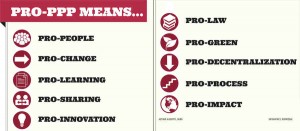Universal policy: PPP is political but nonpartisan
Universal policy: PPP is political but nonpartisan
 Regardless of who wins in today’s presidential elections, whether he or she belongs to a political party or is running as an independent, this voter expects the next president to be pro-public-private partnership (PPP). Even if I were a voter in another country, I will also demand that a pro-PPP stance must be advanced by candidates and would-be head of state.
Regardless of who wins in today’s presidential elections, whether he or she belongs to a political party or is running as an independent, this voter expects the next president to be pro-public-private partnership (PPP). Even if I were a voter in another country, I will also demand that a pro-PPP stance must be advanced by candidates and would-be head of state.
PPP should be a universal policy, a nonpartisan program and an inclusive, not an exclusive, development approach. PPP is now a Sustainable Development Goal adopted by the United Nations, and must be recognized as such by the next president.
I believe that none of the presidentiables will dare say they are against PPPs. Conversely, none of them could or should claim that he or she has monopoly over this development strategy. A true proponent of transformation, innovation, participation and development can propagate PPP, build on the gains of previous administrations, not just the current one, and address the deficits and gaps.
What will differentiate the five would be their emphasis, policies and priority projects, and what structures he or she will establish.
I will, therefore, vote for the candidate who:
- Is pro-PPP and will participate in PPPs even if he or she loses;
- Values the wisdom of others, even oppositors, and does not represent himself or herself to have exclusivity over righteousness and good intentions;
- Believes that PPP should be pro-people, i.e., people, not the contract itself, as the true north of PPPs;
- Shall advance, through PPPs, the marked improvement in the quality of life of the people, especially of the marginalized;
- Shall aggressively combat against the six evils of PPPs, i.e., the 6 Cs—corruption, clientism, capture, conflict of interest, complacency and concealment;
- Will prioritize PPP, and not just pay lip service to it;
- Is willing to learn and who will encourage others to learn about PPPs and, thus, build a PPP Learning Ecology;
- Recognizes the infrastructure gaps and deficits;
- Supports initiatives of local government units in undertaking their own PPPs;
- Will not back a bill that seeks to repeal all local PPP ordinances;
- Will establish the appropriate structure that will communicate to the world that PPP is priority and top level;
- Will allow ordinary people, through civil-society organizations, to be engaged in PPPs so that they will be part of the kitchen;
- Shall promote a broad definition of PPPs and allow nontraditional modalities;
- Shall call a PPP Summit, participated in by all stakeholders, within the first 100 days of his or her term to evaluate current PPP policies and map out priority programs and projects; and
- Will encourage the formation of a PPP Watch to monitor PPP projects.
I hope that in the next six years under the new administration, we will have more PPPs. That journey starts today. We are all part of that journey. We all have a stake in what will happen, and we are all responsible if
nothing happens.
